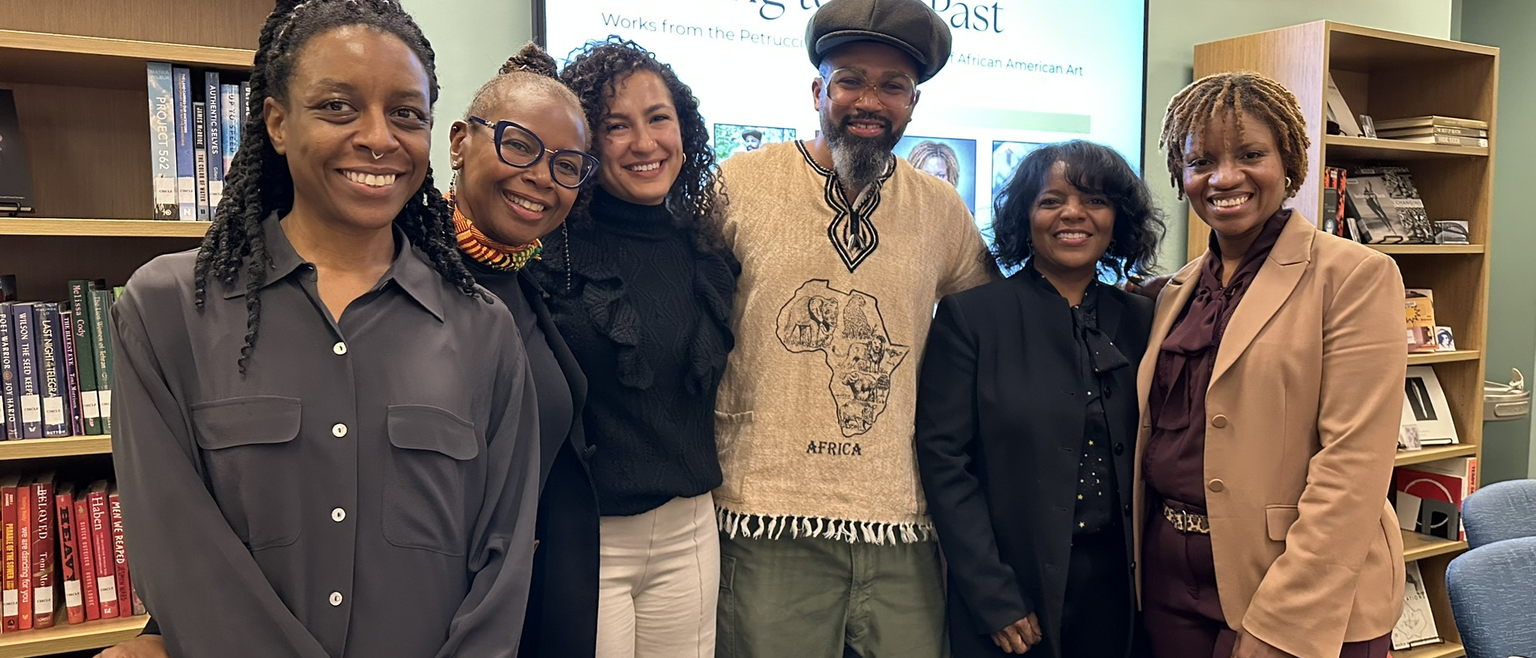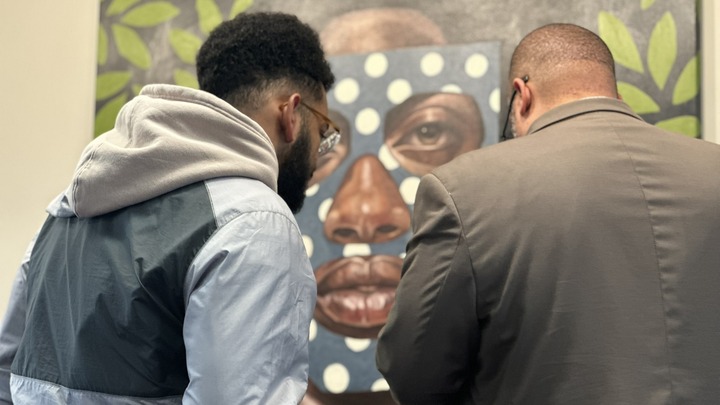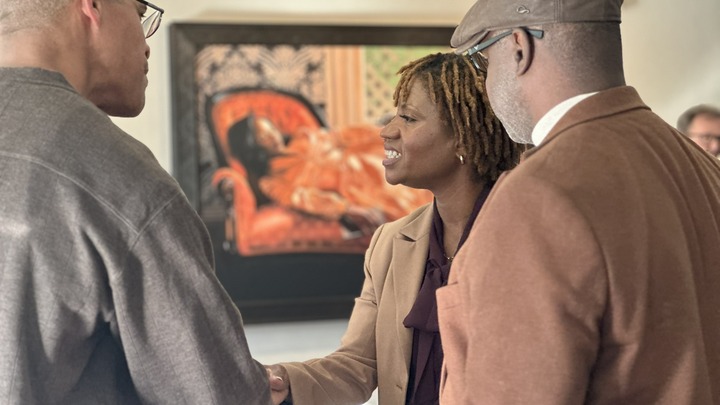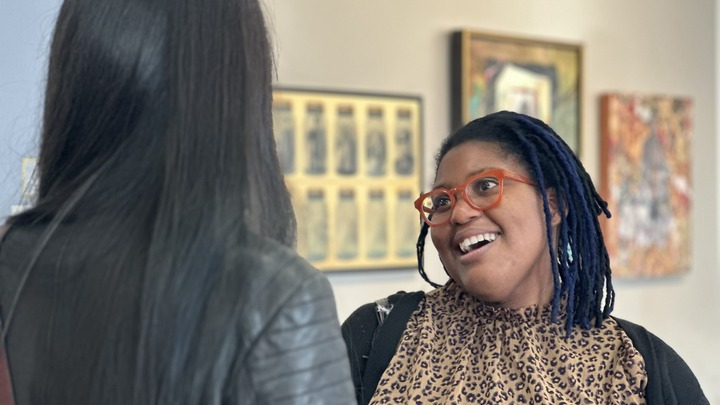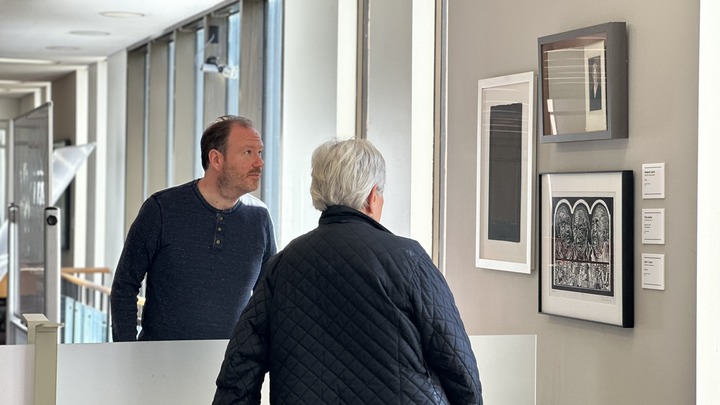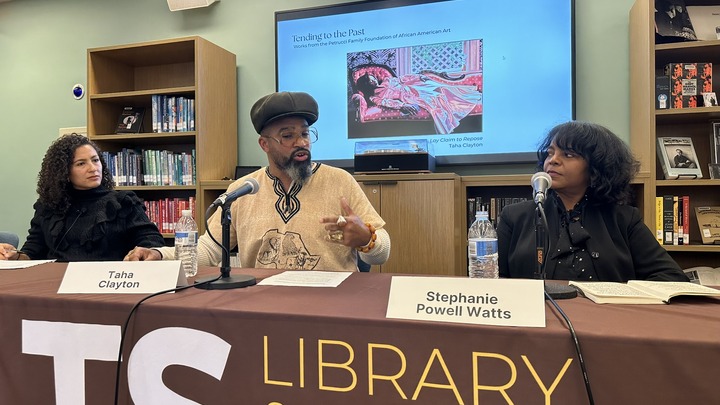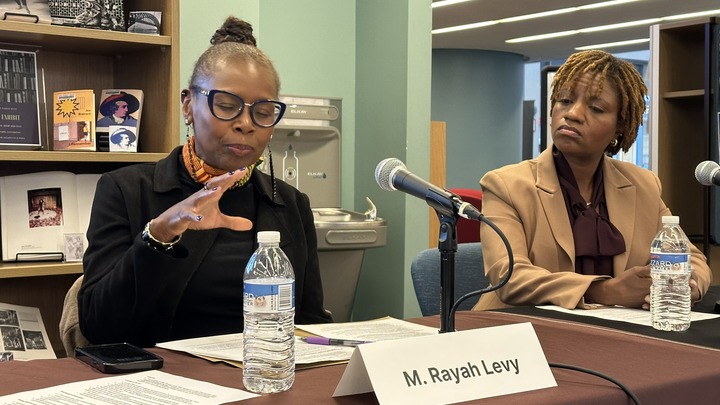On October 16, Lehigh Libraries welcomed artists, educators, and community leaders for Tending to the Past: Works from the Petrucci Family Foundation of African American Art, a panel in celebration of the exhibition of the same name currently on view in Fairchild-Martindale Library.
Curated in partnership with the Petrucci Family Foundation and framed by Lucille Clifton’s poem “i am accused of tending to the past,” the exhibition explores how Black artists have preserved, reckoned with, and reimagined history through creative expression. Assistant University Librarian for Instruction and Outreach Jasmine Woodson began the program by reading Clifton’s poem aloud, later reflecting “In her poem, History becomes a proper noun, a female name, the only word capitalized, underscoring the poem’s personification of History as animate and animating, growing everyday in self-awareness and humanity.” Woodson emphasized that “...naming and tending to our histories is critical for cultivating futures that are rooted in justice and collective learning and shared possibility,” inviting the panelists to reflect on how tending to the past shows up in their communities and creative practices.
That spirit of tending anchored the evening’s conversation. Claudia Volpe, curator and director of the Petrucci Family Foundation Collection of African American Art, guided a dialogue among Taha Clayton, Stephanie Powell Watts, Vinessa Pearson, and M. Rayah Levy. Though their paths span painting, writing, leadership, and librarianship respectively, their work converged on the question of how to preserve the past while keeping it alive for the present.
A self-taught painter based in Brooklyn, Taha Clayton described his artistic process as a form of inquiry into identity, history, and the layers that make up selfhood. “I stopped really focusing on… the pain and the war, and started looking at the perseverance within that… the grandmother holding the granddaughter’s hand. The simple moments,” he said. Drawing on friends and community members, Clayton weaves symbols of strength and remembrance—like cotton flowers and shields—into compositions reflecting personal and collective memory. He emphasized the joy in these experiences, often overlooked in visual storytelling. “There’s so much Americana that’s been painted… but there’s a lot more that just never been seen, and that joy has always existed,” he said. Works like Lay Claim to Repose, featured in the exhibition, portray ordinary life—the ice cream parlor, a picnic, a quiet afternoon reading—imbued with history, resilience, and celebration.
Stephanie Powell Watts, Professor of English, and Robert D. Rodale Chair in Writing, spoke about her novel No One Is Coming to Save Us, and its depictions of aspiration and the American dream – though approached from a different vantage point than other novels in the American canon. “I’m not retelling Gatsby. I’m writing about the same hunger for a better life—but from people who were never invited to the table.” She reflected on the gaps in cultural memory about Black history, using Reconstruction as a striking example. “All of a sudden you realize I know nothing about that—Reconstruction happened, and we were never taught anything about it,” she said, noting how much of this history is hidden and requires intentional research to uncover. “Reconstruction was an amazing experiment. It should have worked, but it did not,” she continued, citing the 1898 Wilmington Massacre as one example of violent suppression. “To honor the lives of the people and to bear witness to what they experienced, we have to know those stories too.”
The question of how to preserve those stories resonated throughout the evening. Vinessa Pearson, Managing Director of Watsvine Consulting LLC, shared how her lifelong love of art—and her early proposal for a Black art exhibition—helped connect the Petrucci Family Foundation with Lehigh Libraries. “We would go to the Philadelphia Art Museum, and there are permanent pieces there that have been there for decades, but each time I would take my kids to the art museum, they would see something different that they didn't see before,” she said. “So art is always changing, because we're evolving. Times are changing. Although the piece is the same, we see it differently.” Pearson’s insight underscored the exhibition’s central theme: that memory, like art, is not fixed but dynamic—continuously renewed across time and with different perspectives.
M. Rayah Levy, Public Services and Information Literacy Librarian at Moravian University, brought the conversation close to home through her work on the Black Bethlehem Project, which preserves oral histories from Black residents of the Lehigh Valley. “We realized if we didn’t start collecting these stories now, we’d lose them,” Levy said. “History isn’t just what’s written down—it’s what people remember, what they’ve lived.” With support from local partners, the project records stories of family, migration, education, and community life. “When people pass away, we’re left interpreting the artifacts they leave behind,” Levy said. “But when you talk to them now, you hear the truth directly. That’s the real archive.” For Levy, representation and preservation are inseparable. “Every child in this city deserves to see themselves in the story of Bethlehem,” she said. “That’s how we build belonging.”
As the discussion drew to a close, Volpe invited the panelists to reflect on the balance between labor and rest, and how to sustain the work of care. Clayton described gratitude as his form of rest: “I push myself to do more, but I also make space to be thankful. To be present with what I’ve already done.” Levy connected rest to stillness and collective renewal, saying “We talk a lot about resilience, but rest is part of that, which Powell Watts reiterated, saying, “In behavioral psychology, there’s something called a post-reinforcement pause—a moment after the reward, before the next push. That’s what rest is for me.” Pearson spoke of her new practice as a student of cello: “After a hard day, practicing is how I come back to myself. It’s my reminder that creativity doesn’t always have to be for an audience.”
By the end of the evening, the panel had traced a shared vision of what it means to tend, to art, to history, to one another. Through paint, story, memory, and community, each panelist revealed that tending to the past is not about preservation alone, but participation and sustaining an ongoing conversation between what was and what might be.
Tending to the Past: Works from the Petrucci Family Foundation of African American Art remains on view in Fairchild-Martindale Library through March 2026. The exhibition is supported by the Friends of the Lehigh University Libraries.
Discover more on the themes of the exhibition through the libraries’ curated collection of ebooks and audiobooks, and streaming feature films and documentaries. View the digital images from the exhibit at go.lehigh.edu/tttp. View the event Photo Album.
